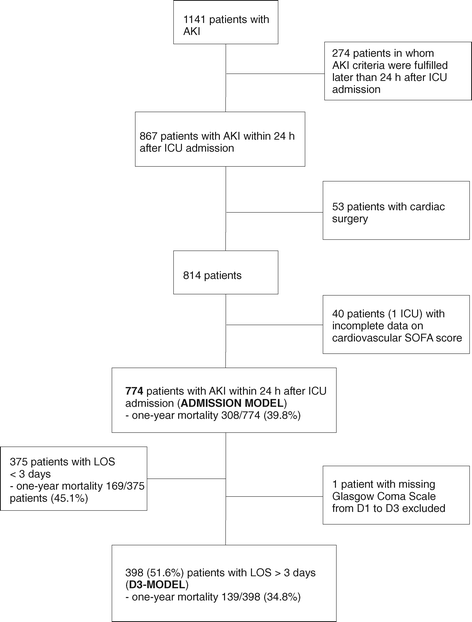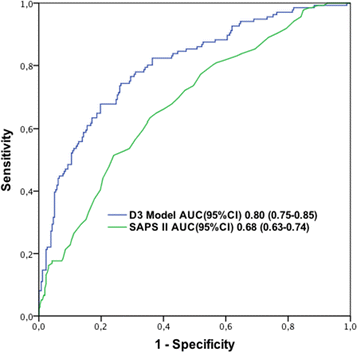Predicting one-year mortality of critically ill patients with early acute kidney injury: data from the prospective multicenter FINNAKI study
- PMID: 25887685
- PMCID: PMC4407305
- DOI: 10.1186/s13054-015-0848-2
Predicting one-year mortality of critically ill patients with early acute kidney injury: data from the prospective multicenter FINNAKI study
Abstract
Introduction: No predictive models for long-term mortality in critically ill patients with acute kidney injury (AKI) exist. We aimed to develop and validate two predictive models for one-year mortality in patients with AKI based on data (1) on intensive care unit (ICU) admission and (2) on the third day (D3) in the ICU.
Methods: This substudy of the FINNAKI study comprised 774 patients with early AKI (diagnosed within 24 hours of ICU admission). We selected predictors a priori based on previous studies, clinical judgment, and differences between one-year survivors and non-survivors in patients with AKI. We validated the models internally with bootstrapping.
Results: Of 774 patients, 308 (39.8%, 95% confidence interval (CI) 36.3 to 43.3) died during one year. Predictors of one-year mortality on admission were: advanced age, diminished premorbid functional performance, co-morbidities, emergency admission, and resuscitation or hypotension preceding ICU admission. The area under the receiver operating characteristic curve (AUC) (95% CI) for the admission model was 0.76 (0.72 to 0.79) and the mean bootstrap-adjusted AUC 0.75 (0.74 to 0.75). Advanced age, need for mechanical ventilation on D3, number of co-morbidities, higher modified SAPS II score, the highest bilirubin value by D3, and the lowest base excess value on D3 remained predictors of one-year mortality on D3. The AUC (95% CI) for the D3 model was 0.80 (0.75 to 0.85) and by bootstrapping 0.79 (0.77 to 0.80).
Conclusions: The prognostic performance of the admission data-based model was acceptable, but not good. The D3 model for one-year mortality performed fairly well in patients with early AKI.
Figures


References
-
- Knaus WA, Harrell FE, Jr, Lynn J, Goldman L, Phillips RS, Connors AF, Jr, et al. The SUPPORT prognostic model. Objective estimates of survival for seriously ill hospitalized adults. Study to understand prognoses and preferences for outcomes and risks of treatments. Ann Intern Med. 1995;122:191–203. doi: 10.7326/0003-4819-122-3-199502010-00007. - DOI - PubMed
Publication types
MeSH terms
LinkOut - more resources
Full Text Sources
Other Literature Sources

